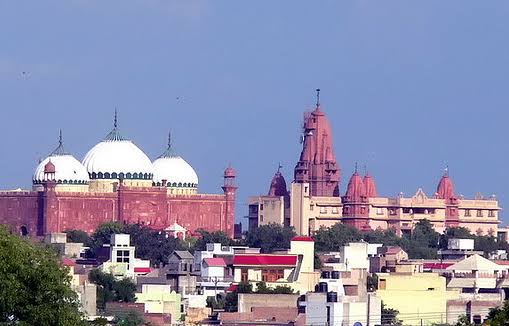
Explained: The Krishna Janmabhoomi case and the controversy behind it
The ownership of the 13.37 acres of land in Mathura surrounding the Krishna Janmabhoomi -- where both the idgah and temple are built -- has been a bone of contention for long

Coming on the heels of the video survey ordered by a court inside the Gyanvapi mosque complex in Varanasi, the Mathura district court on Thursday allowed a plea seeking to remove the Shahi Idgah Masjid from the complex it shares with the Katra Keshav Dev Temple as admissible. The lower court which had earlier dismissed the plea is now bound to hear it.
The Krishna Janmabhoomi case
On September 24, 2020, Lucknow resident and advocate Ranjana Agnihotri and six others filed a plea in the lower court to remove the 17th century Shahi Idgah mosque from the complex it shares with the Katra Keshav Dev Temple, close to the spot known as ‘Krishna Janmabhoomi’. The petitioners filed the pleas under “next friend of Bhagwan Sri Krishna Virajman”.
They had claimed that the Shahi Idgah Masjid is constructed on a part of 13.37-acre land belonging to the Sri Krishna Janmabhoomi Trust. They had demanded the mosque be removed and the land returned to the Trust. However, the civil judge senior division rejected the suit on September 30, 2020, as non-admissible, stating that none of the petitioners was from Mathura and therefore had no valid stake in the matter.
The petitioners then moved the district court, seeking a revision of the order. The arguments between both sides — Ranjana Agnihotri and her co-petitioners vs the Sunni Central Waqf Board and the Secretary of Shahi Idgah Masjid and two others — on the admissibility of the suit were concluded on May 5.
After hearing the arguments, District and Sessions Judge Rajeev Bharti allowed the revision on Thursday, meaning the original suit will have to be heard by the lower court now, an official of the court said. This time, the Trust and temple authorities have been made party to the suit.
“The court has allowed revision of the lower court order and had directed the lower court to register the suit as a regular suit,” District Government Counsel (Civil) Sanjai Gaur said. Advocate Hari Shankar Jain, who is representing the petitioners of the suit, said, “The court has said they (the petitioners) have the right to sue.”
The legend
The Krishna Janmbhoomi temple in Mathura town of Uttar Pradesh is much revered by Hindus. It is believed to have been built around the prison cell in which Lord Krishna was said to have been born. According to legend, the temple was built by Vajranabha, Krishna’s great-grandson, in the 6th century BC.
The temple, in its current form, has undergone many renovations in the 20th century. It consists of the Keshav Deva Temple, with the sanctum sanctorum and the Bhagavata Bhavan.
The controversy and legal history
The ownership of the 13.37 acres of land surrounding the Krishna Janmabhoomi — where both the idgah and temple are built — has been a bone of contention for long.
As per historical records, Idgah was built around 1669 near the ruins of a Krishna temple. In 1935, the Allahabad High court upheld the ownership of the land in the hands of the King of Varanasi. In 1944, the land was purchased by the businessman Yugal Kishor Birla who established the Sri Krishnabhoomi Trust with the intention to build a Krishna temple in the area. The Shri Krishna Janmasthan Seva Sangh was set-up in 1958. The Seva Sangh later took over the roles and responsibilities of the temple trust.
Also read: SC on Gyanvapi: Protect Shivling, but don’t stop Muslims from namaz
In 1964, the Sangh filed a civil lawsuit regarding ownership of the land. A year later, in 1965, the temple trust and the Shahi Idgah mosque management committee reached a signed agreement according to which the ownership of the land remained with the temple trust, but the Trust Masjid Idgah had management rights to run the temple. This meant that the temple trust no more had a right to stake claim on the masjid land.
In 2020, a civil suit filed in Mathura alleged that the Committee of Management of Trust Masjid Idgah has illegally encroached upon Krishna Janmabhoomi land. According to the suit, “the Committee of Management of Trust Masjid Idgah entered into an illegal compromise on October 12, 1968, with the Society Shree Krishna Janamasthan Seva Sangh and both have played “fraud upon the court, the plaintiff deities and devotees” with a view to capture and grab the property in question.

